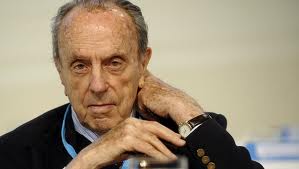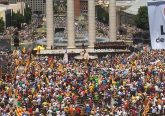 Manuel Fraga Iribarne, who died on the 15th January (at 89), was a lion of modern Spanish conservatism. Born in 1922 in a small Galician town, he was the son of Spanish immigrants who had spent a year working in Cuba. His mother was a French-Basque teacher. In his early academic career he excelled in degrees in law, politics and economics and passed several of the most competitive exams for recruitment in Franco’s Public Administration before becoming a professor of state theory, a lawyer to the Congress and a diplomat.
Manuel Fraga Iribarne, who died on the 15th January (at 89), was a lion of modern Spanish conservatism. Born in 1922 in a small Galician town, he was the son of Spanish immigrants who had spent a year working in Cuba. His mother was a French-Basque teacher. In his early academic career he excelled in degrees in law, politics and economics and passed several of the most competitive exams for recruitment in Franco’s Public Administration before becoming a professor of state theory, a lawyer to the Congress and a diplomat.
Highly cultivated, prolific and hardworking, he wrote approximately 80 books on history, politics and law. His encyclopaedic essay ‘La crisis del Estado’ (The State’s Crisis), influenced by Carl Schmitt, is arguably among the most interesting works in Spanish political literature and his academic achievements made of him one of Spain’s rising intellectual stars. When General Franco appointed numerous technocrats in the mid 1950s and the 1960s, to modernise the economy, Mr. Fraga was soon recruited for the Public Administration and later became a minister.
The Franco Years
As Minister for Tourism and Information in the mid-1960s, Mr Fraga proposed reforms of Franco’s authoritarian regime, trying to move it towards a more democratic system. While outstanding as a young technocrat, Fraga proved to be an even better politician. His ambitions and reformist policies clashed with the establishment and with Franco’s Premier, Mr. Carrero Blanco, yet during his tenure, Fraga mitigated censorship, promoted tourism and supported state-owned hotels in historical sites to attract income and foreigners (and, with their influence, helped modernise a rigid Spanish society).
Ironically, the civil servants in Franco’s economic advisory proposed modern and liberal economic policies that brought intense growth and development during the 1960s, but when it came to political reform, however, they resisted change. Fraga, meanwhile, a professor and constitutional legal scholar, advocated for political modernization, finding the Franco regime to be outdated. Yet, he was not a strong proponent of economic liberalisation, but rather believed in the state playing a strong role in the economy.
Fraga’s mercurial, hyperactive and authoritarian character did not help him bridge personal differences and his clashes reached a peak with the Matesa Affair, a row over the misuse of state funds. Though Fraga was not implicated, he tried to use the incident to his advantage to weaken his opponents and promote his reformist agenda. As a result, in 1969, Fraga was replaced and sent to London as ambassador to the United Kingdom. His reputation as a moderniser was criticised by those who remember how, as Minister, he failed to oppose the death penalty of Julián Grimau (a communist leader accused of crimes during the civil war), as well as his failure to publicly decry the murder of Enrique Ruano, a student killed whilst under arrest (and the subsequent publication of Ruano’s private diaries to portrait him as someone with mental problems).
Soon before coming to London, Fraga became involved in foreign policy as commissioner for the 1968 decolonisation of Equatorial Guinea, one of the last Spanish colonies in Africa. When moderate Bonifacio Ondo, the Spanish-backed presidential candidate, was narrowly beaten in the country’s first democratic elections by the more hostile Francisco Macias, the Spanish government was excluded from the independence process. Equatorial Guinea’s move away from colonial rule was fractious and problematic— an experience that reinforced Fraga’s concerns about hastened efforts towards democratisation.
Supporting Democracy
As ambassador in London from 1973 to 1975, Fraga distanced himself from the Spanish government. A conservative reformer, he admired the British and wrote extensively on democratisation and conservatism. Traditionally, Spanish scholars had looked to France as a political reference for reforms and modernisation, but Fraga was an exception; ge thought that Britain should be the reference point for political modernization, and that France should be revered more for its gastronomic expertise than its political successes.
In London, the dedicated Fraga polished his image as a moderniser ready to lead Spain to democracy. He had regular contact with people from all political backgrounds, including left-wing dissidents in exile, and promoted the idea of a ‘political centre’. Fraga believed that although Franco remained popular, his authoritarian regime would ultimately crumble in the face of international pressure and the economic growth and transformations witnessed during the 1960s and 1970s. Thus, anticipating Samuel Huntington’s ‘Third Wave’ thesis, he tried to foster both democratisation and continuity. A reformer during the Franco regime, and a Catholic democrat allied with King Juan Carlos, Fraga tried to be a man for all seasons. He carefully designed a process of gradual reforms, helped to set up the newspaper El País and, as an effective moderniser and prestigious academic, he was seen then as the architect to prepare Spain’s transition to democracy.
Upon Franco’s death in November 1975, King Juan Carlos became Head of State and Fraga returned to Spain as Home Secretary and Deputy Prime Minister. He entered a highly tense situation— following Franco´s death and with a young and inexperienced King Juan Carlos, Spain faced a great deal of social unrest and economic crisis. Fraga tried to maintain public order, but in the process, his reputation as a moderniser was thrown away after some police repression episodes that culminated with the shooting by policemen of strikers in Vitoria in March 1976 (though Fraga was outside of Spain at the time of the incident).
Many felt that, once underway, processes for increased democratisation and freedom do not often slow down to accommodate gradual reform. King Juan Carlos disagreed with Fraga’s rigid personality and his scepticism towards major reforms, leading to his decision to replace him with the younger, less qualified (but more agreeable) Adolfo Suárez on July 1976, in an effort to speed up democratisation.
Out of office, Fraga found himself pigeon-holed as a member of the right and a former Franco official, but accepted to seek candidacy on a platform shared with former moderate Franco ministers. These men were highly qualified technocrats but had enjoyed little popular appeal since Franco’s death. It soon became clear that Fraga, raised during an authoritarian regime, understood politics as an exercise of authority based on merits, while the younger vanguard of politicians, such as King Juan Carlos and Suárez, were of the mindset that democracy was based on seduction, something which Fraga had never practiced.
Suárez managed to implement a plan for Spanish transition designed by Professor Fernandez Miranda. This plan intended for Spain to evolve from a Francoist state to a constitutional democracy through progressive legal reforms. Amidst rapid democratic change, Fraga, once seen as a moderniser too progressive for the Franco regime, had now become too conservative to be regarded as a democratic leader.
There was an upside to these developments for Fraga. Bypassed and isolated, he was a poor short term tactician in democracy, but he felt capable at long term analysis. He soon realised that while Suárez’s radical rupture with the previous regime, in combination with the surge in Basque and Catalan nationalism, might give him votes in the short term, such support could not last. Rather, it would fragment the centre-right into several small groups of liberals, conservatives and regionalists that would be easily beaten by the Socialists. Suárez’s platform was headed for an implosion.
 Fraga decided then to build a middle class conservative party modelled after the British. His challenge was to reconcile his role as Franco’s Minister with his credibility as a democrat. Now that Spain was enjoying its newly-discovered freedom and had left Francoist moralism behind, Fraga’s moderate conservatism, once a bridge to democracy, became a burden. Just as Shackleton learnt in Browning’s ‘Prospice’, ‘the worst turns the best to the brave’, Fraga struggled alone to explain that democracy and political freedom should be achieved without losing sight of the traditional values. In this sense, he was carrying on the legacy of the values (merit, order and responsibility) of the great Spanish political thinkers, from Jovellanos and Balmes, to Maeztu and Ortega, as well as the spirit of reformers, from Canovas to Maura. Swimming against the tide, Fraga managed to support democratisation without formally breaking
with Francoism, in order to unite all middle class and conservatives and also attract Francoists to democracy.
Fraga decided then to build a middle class conservative party modelled after the British. His challenge was to reconcile his role as Franco’s Minister with his credibility as a democrat. Now that Spain was enjoying its newly-discovered freedom and had left Francoist moralism behind, Fraga’s moderate conservatism, once a bridge to democracy, became a burden. Just as Shackleton learnt in Browning’s ‘Prospice’, ‘the worst turns the best to the brave’, Fraga struggled alone to explain that democracy and political freedom should be achieved without losing sight of the traditional values. In this sense, he was carrying on the legacy of the values (merit, order and responsibility) of the great Spanish political thinkers, from Jovellanos and Balmes, to Maeztu and Ortega, as well as the spirit of reformers, from Canovas to Maura. Swimming against the tide, Fraga managed to support democratisation without formally breaking
with Francoism, in order to unite all middle class and conservatives and also attract Francoists to democracy.
During the 1980s, Suárez lost control over his party and the government and resigned. The Socialists won by a landslide and Fraga led the weak parliamentary opposition. Though never a real threat to the Socialists’ overwhelming hegemony in media and parliament in the 1980s, an isolated Fraga endured and rallied all Spanish regions to build a moderate conservative base, growing from a 7% to a 27% of the votes. While other right-wing leaders either deserted the cause or joined the left to profit from its structural advantage (which cleverly used Franco’s regime to portray the right as repressive and intrinsically antidemocratic) and Suárez “centre party” was collapsing, Fraga’s solitary work from 1977 to 1989 to build a united center-right party recalls Tennyson’s final line in Ulysses’ monologue: ‘to strive, to seek, to find, and not to yield’.
Though younger, alternative candidates received funding in an effort to modernise the centre-right and money and media manoeuvred against Fraga, voters preferred him to other candidates. Fraga surrounded himself with a younger team and focused his speeches on the risks of socialism, such as the creation of dependent societies, which, through their support of welfare and subsidies, weakened values such as work, responsibility and merit; in turn, societies would become less competitive and free. He emphasized that the Basque and Catalan nationalist movements distracted Spain’s ability to face an ever-changing world and economy. In 1989, after failing to gain more than 30% of the voter’s support (in part because of unpopular aspects of his mercurial personality and his past as a minister of the Franco dictatorship) Fraga chose José María Aznar as his successor. Aznar would later become Premier in 1996.
In 1989, Fraga returned to his homeland, the northern region of Galicia, where he was elected four times as governor. He worked to model Galicia after Franz-Josef Strauss’ Bavaria, a region of traditions with a modern, competitive economy. He promoted the development of infrastructure, tourism and Galicia’s traditional symbols and language to shape an identity that simultaneously could incorporate Galicia’s unique cultural traditions and its full integration in Spain.
 Mountainous and isolated, Galicia and its 2.8m inhabitants form a unique society. With his paternal approach, Fraga had broad appeal, as evidenced by a national media broadcast featuring priests in rural areas asking the public to vote for ‘Catholic Fraga’ during his first campaign and women working at a Vigo brothel distributing his leaflets in clubs. Under his leadership, Galicia prospered substantially, though not as much as Fraga had hoped, in part because he preferred state-run economies as opposed to markets, and adopted Gaullist-like economic policies with strong state planning, rather than free market programmes. Educated in the Adenauer and Churchill years, Fraga never fully embraced the liberal economic views of the 1980s and 1990s. Nonetheless, Zara and other successful retail groups, support for local industry, growing pilgrimages to Santiago, and massive investments in new infrastructures and education projects have greatly transformed and improved the region. Eisenman’s controversial ‘City of Culture’ was his last great project for the now vibrant Galicia.
Mountainous and isolated, Galicia and its 2.8m inhabitants form a unique society. With his paternal approach, Fraga had broad appeal, as evidenced by a national media broadcast featuring priests in rural areas asking the public to vote for ‘Catholic Fraga’ during his first campaign and women working at a Vigo brothel distributing his leaflets in clubs. Under his leadership, Galicia prospered substantially, though not as much as Fraga had hoped, in part because he preferred state-run economies as opposed to markets, and adopted Gaullist-like economic policies with strong state planning, rather than free market programmes. Educated in the Adenauer and Churchill years, Fraga never fully embraced the liberal economic views of the 1980s and 1990s. Nonetheless, Zara and other successful retail groups, support for local industry, growing pilgrimages to Santiago, and massive investments in new infrastructures and education projects have greatly transformed and improved the region. Eisenman’s controversial ‘City of Culture’ was his last great project for the now vibrant Galicia.
At 82, Fraga ran for a fifth term as governor and lost narrowly. But the party he founded recently won Spain’s general elections and rules again both in Galicia and Madrid. The People’s Party, as it is now called, proposes to retrieve the traditional values of work, merit and responsibility, unpopular during the years when only ‘freedom’ mattered. When asked about his role as Franco’s Minister, Fraga has stated, “No one chooses the period in which he lives or the circumstances in which he works. One only decides what one can try to do with them, and I tried more than most to improve things”. Even Fraga’s socialist rivals concede him this.
Fraga died in a small and modest flat in Madrid, with little more than his savings. And yet, with the party he founded back in power and now representing the majority of the Spanish voters. In Spenser’s words ‘Ease after war, death after life does greatly please’.
This post is co-authored by Inigo Tellechea and Manuel Muniz.
Inigo Tellechea is a lawyer and holds an LLM from the University of Bristol.
Manuel Muniz is a lawyer and DPhil student in International Relations at Oxford. He also holds a Masters in Public Administration from Harvard University (@Manutemuniz).






1 Comment